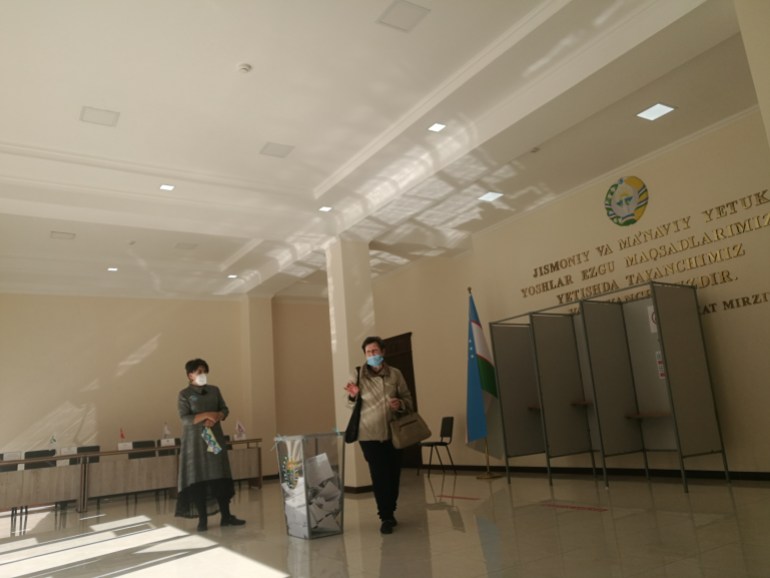Uzbekistan’s president seeking to extend grip on power: Analysts
President Shavkat Mirziyoyev has called for a snap poll on July 9, which could leave him in power until 2040.

Uzbek President Shavkat Mirziyoyev took part in Russia’s most important annual public event this week – the May 9 celebration of the USSR’s victory over Nazi Germany in 1945.
Russian President Vladimir Putin has turned “Victory Day” into a huge ceremony, where leaders of ex-Soviet nations show up to re-confirm their alliances.
Keep reading
list of 3 itemsUzbekistan votes on referendum to extend president’s term limits
Uzbekistan’s leader calls for snap presidential election in July
Some of them, including Mirziyoyev, also have a taste for the political longevity Putin seems to desire.
After Russia’s constitution was amended in 2020 to “annul” Putin’s previous terms, nothing but his own mortality prevents the septuagenarian from presiding over 13 more Victory Day parades.
Mirziyoyev, who ruled Central Asia’s most populous nation since 2016 and was re-elected in 2021, followed Putin’s steps.

Just hours before flying to Moscow, he announced a snap presidential vote scheduled for July 9.
The elections would follow the April 30 referendum that amended Uzbekistan’s constitution, scrapped Mirziyoyev’s previous terms and extended future terms to seven years.
Such amendments have become common in post-Soviet states.
Standing next to Mirziyoyev during the Victory Day parade were Belarusian President Alexander Lukashenko and Tajik leader Emomali Rahmon, who extended their terms through constitutional amendments twice.
So did Mirziyoyev’s iron-fisted predecessor Islam Karimov, who ruled Uzbekistan after its 1991 independence until his 2016 death.
“It’s absolutely obvious that Mirziyoyev also intends to rule [his] nation for the rest of his life,” Alisher Ilkhamov, Uzbekistan-born head of Central Asia Due Diligence, a London-based group, told Al Jazeera.
Another Victory Day participant, Kazakh President Kassym-Jomart Tokayev, seemed modest in comparison.
Last year, he amended Kazakhstan’s constitution and was re-elected – but just for one term, until 2029.

‘Mine, yours, ours’
In advance of the referendum, Mirziyoyev’s government trained 140,000 activists to educate average Uzbeks about the reform.
Pre-schoolers at one kindergarten were filmed belting out the campaign’s main slogan, “The constitution is mine, yours, ours!”, while one billboard featured a woman whose “life begins after 30” – after April 30, that is.
Subway announcements urged passengers “not to lean on doors and lean on the constitution instead,” while every mobile phone user received daily text messages reminding them to vote.
As a result, the official turnout reached almost 85 percent, and 90 percent of voters approved the amendments.
“To the people around me, it was obvious why all of that is done, so they felt deeply indifferent,” Timur Karpov, a human rights activist and the owner of an art gallery in the Uzbek capital, Tashkent, told Al Jazeera.
But despite violations reported in Tashkent, he did not doubt the high turnout.
“Such events always take place with a very high turnout, especially when one is lured with [free] plov,” a traditional Uzbek dish of rice, carrots and meat which was handed out at many polling stations, he said.
The “annulment” will allow Mirziyoyev to stay in the Aq Saray (White Palace), a presidential residence, for 14 more years, until 2040, when he will have turned 84.
From reformist to autocrat?
Mirziyoyev’s recent steps contrast with the dawn of his rule.
For 13 years, he served as Karimov’s prime minister, keeping a low profile and distancing himself from his hot-tempered boss’s excesses.
One of them was the 2005 order to mow down a crowd of protesters in the eastern city of Andijan that became the ex-USSR’s biggest and bloodiest crackdown on a popular revolt.
Another was a decades-long practice of forcing Uzbek farmers to grow cotton and sell it to the government at a fixed low price.
Every autumn, millions of government employees and high school and university students were herded to cotton fields for weeks as part of one of the world’s largest systems of forced labour.
The practice made Uzbekistan a major importer of raw cotton and created one of the worst man-made environmental disasters in history.
Mirziyoyev dismantled “cotton slavery” by allowing farmers to sell raw fibre at market prices and promoting the domestic textile industry.

He conducted sweeping and long-awaited reforms that lowered and simplified taxes, removed hurdles for businesses and allowed hundreds of thousands of Uzbeks to
solve their bureaucratic problems via direct petitions on Mirziyoyev’s website.
He also purged the ranks of prosecutors and security officers, closed down an infamous jail where, according to prisoners, two dissidents had been boiled alive, and released thousands of political prisoners and Muslims jailed for alleged “extremism”.
But the reforms were soon cut short.
“The parliamentary development has been suspended, the [presidential] administration usurped the government’s functions, the Cabinet can’t independently sort out even matters of potato growing,” Tashkent-based political blogger Timur Numanov told Al Jazeera.
To him, the snap vote is an attempt to avoid the emergence of charismatic competitors and start unpopular reforms such as the introduction of market prices for natural gas and utilities.

“What’s going to change in two months [before the July 9 vote]? Exactly, nothing – no new party will emerge, neither will there be an unexpected alternative candidate,” he said.
Uzbekistan was one of the ex-USSR’s biggest exporters of natural gas.
But construction of gas-consuming chemical plants limited exports and led to dire shortages in the domestic market.
During the unusually cold last winter, many Uzbeks had to cut down trees and start fires next to their apartment buildings to stay warm and cook food.
In recent years, a construction boom skyrocketed real estate prices, but thousands of Uzbeks were offered tiny compensations for their apartments and houses razed to the ground to give way to luxurious condos or business centres.
“I got a two-bedroom apartment for the five-bedroom house my father built 43 years ago,” a resident of the eastern city of Ferghana told Al Jazeera on condition of anonymity. “What reforms are we talking about?”